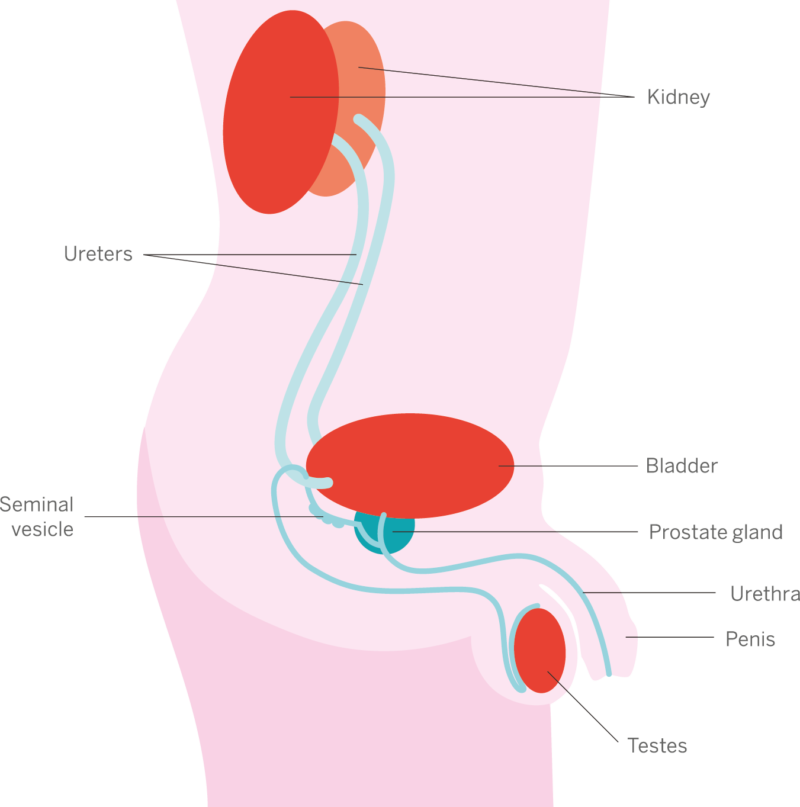There are several ways to determine if a patient has prostate cancer, as opposed to other potential prostate issues. In this section, we cover the facts about prostate cancer, its signs and symptoms.
Prostate Cancer Facts
What is prostate cancer?
Symptoms of prostate problems
Listed below are some symptoms that are usually caused by benign disease, not prostate cancer. So do not worry if you have any of these symptoms, but do go to your doctor to have them checked as there are treatments that can help to reduce or eradicate these symptoms.
- Difficulty or pain in passing urine
- Having to rush to the toilet to pass urine
- Frequent visits to the toilet, especially at night
- Starting and stopping while urinating
- Dribbling urine
- A feeling of not having emptied the bladder fully
Sometimes, the following things can also be symptoms of prostate cancer.
- Blood in the urine or semen.
- Back pain, pelvis pain, or hip pain.
- Difficulty getting or keeping an erection.
- Unexplained weight loss.
It is important to note that prostate cancer often has no symptoms.
Risk factors of prostate cancer
- Age The risk of developing prostate cancer increases as you get older and most cases are diagnosed in men over the age of 50.
- Race/ethnicity Black men over 45 have an increased risk of prostate cancer.
- Family history You’re much more likely to have prostate cancer if your father or brother has had it, especially if they were under 60. Research shows that having a close relative with breast cancer may also increase your risk.
- Lifestyle factors There is some evidence that obesity and diet has an effect.

What is the prostate?
The prostate is a small gland, about the size of a walnut, found only in men and is located just below the bladder.
When men pass urine, it flows through a tube (urethra) and out through the penis. The urethra has to pass through the prostate before reaching the penis. This is why some men have problems with urinating when they have an enlarged prostate. Fluid produced by the prostate forms part of semen and may help to nourish sperm.
What goes wrong with the prostate?
As men get older, the prostate gland increases in size. Many men will develop a condition called benign prostatic hyperplasia (BPH). BPH is not cancer. Men who have difficulty urinating may have drug therapy or an operation called a TURP (transurethral resection of the prostate) to relieve the symptoms of BPH.
Prostate cancer can, in some advanced cases, cause urinary difficulties similar to those for BPH. So, some men with prostate cancer may be offered a TURP. This procedure involves cutting away part of the prostate in order to relieve symptoms associated with an enlarged prostate. It is done under general or spinal anaesthetic so you will not feel any pain, and most patients will need to stay in hospital for around one to three nights following the procedure. This operation does not cure prostate cancer.
What is cancer?
Your body is made up of trillions of cells that continuously renew themselves to replace old or damaged tissue. When the renewal process gets out of control and begins to invade healthy tissue, it is called cancer. However, cancers are different from benign (non-cancerous) growths, which are more common and do not invade healthy tissue. All cancers are described as ‘malignant’. Other words for describing a cancer are tumours and neoplasms. Sometimes cancer cells break away from the original site and settle in other parts of the body, causing further damage. When this happens the cancers that have spread are called ‘metastases’ or ‘secondaries’.
Around one in eight men will get prostate cancer at some point in their life. This risk rises to one in four for Black men. More than half of men diagnosed with prostate cancer are over 70. Prostate cancer cells usually grow very slowly and many men will live out their whole lives without the cancer being discovered or causing any symptoms.
